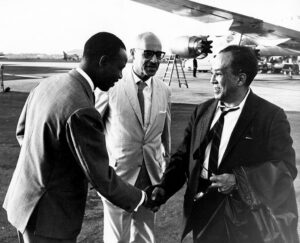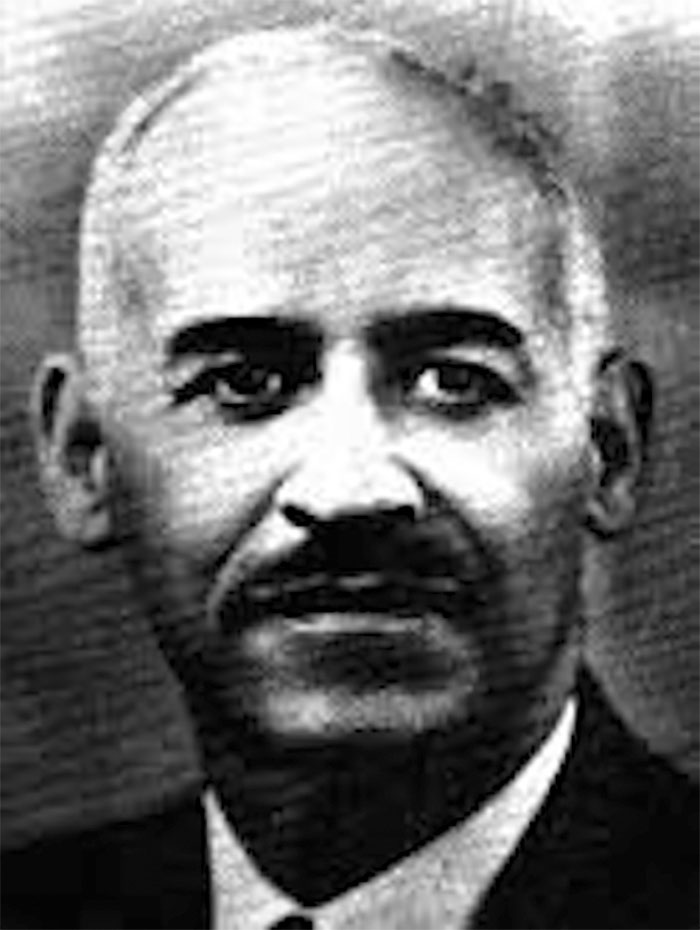WILL MERCER COOK (1903-1987)
Will Mercer Cook served as the United States ambassador to the Republic of Niger from 1961 to 1964. Cook directed U.S. economic, social, and cultural programs in Niger, which included the Peace Corps. During the mid-1960s he also became the special envoy to Gambia and Senegal.
Will Mercer Cook was born on March 30, 1903, in Washington, D.C., to Will Marion Cook, a composer and Abbie Mitchell Cook, an actress and classical singer. Cook had one sibling, Abigail, an older sister. During his childhood, he frequently traveled with his family as they performed at various venues throughout the United States and abroad. Jazz superstar Duke Ellington lived on the same block in Cook’s middle class Washington, D.C. neighborhood.
Cook attended Washington, D.C. public schools and graduated from the historic Paul Laurence Dunbar High School in the city. In 1925 he earned his bachelor’s degree in French language and literature from Amherst College in Massachusetts and a teacher‘s diploma the following year from the University of Paris in France. In 1929 Cook married Vashti Smith and they had two sons, Mercer and Jacques. Cook earned a master’s degree in French language and literature in 1931 from Brown University in Rhode Island and a doctorate from the same institution in 1936.

Courtesy Howard University
While still a graduate student, Cook was hired as an assistant professor of romance languages for one year at Howard University in Washington, D.C. After he earned his doctorate, Cook joined the foreign language faculty of Atlanta University in Atlanta, Georgia where he taught French until 1943.
During his career at Atlanta University, Cook received the prestigious Rosenwald Fellowship to conduct research abroad in Paris and the French West Indies. In 1943 Cook also became a professor at the University of Haiti. While in Haiti he authored the Handbook for Haitian Teachers of English and other studies related to the Haitian experience.
Cook completed his tenure in Haiti in 1943 and moved that same year to Washington, D.C. to accept what would become a permanent position as professor of romance languages at Howard University. While at Howard, Cook continued to produce scholarship on Haiti and he translated the works of African authors.
During the late 1950s Cook shifted his career to focus more on international relations. In 1958 he became foreign representative for the American Society of African Culture and later an administrator in the Congress of Cultural Freedom. President John F. Kennedy, in 1961, appointed Cook to serve as U.S. Ambassador to the Republic of Niger, a position he held until 1964. Cook also served from 1964 to 1966 as special envoy to Senegal and Gambia.
Upon the completion of his foreign relations service, Cook rejoined the faculty of Howard, serving as chair of the department of romance languages. He also became a visiting professor at Harvard University. During the final phase of his teaching career, Cook continued to produce scholarship and translate texts of African and Caribbean scholars. In 1969, he co-authored with Stephen Henderson the groundbreaking anthology The Militant Black Writer in Africa and the United States. In 1970 Cook retired from teaching, but continued to publish books and articles.
On October 4, 1987, Will Mercer Cook died of pneumonia at the age of 84 in a Washington, D.C. hospital.
8888888888888888888888888888888888888888888888888888888888888888888888888888888888
Will Mercer Cook (March 30, 1903 – October 4, 1987), popularly known as Mercer Cook, was an American diplomat and professor. He was the first United States ambassador to the Gambia after it became independent, appointed in 1965 while also still serving as ambassador to Senegal.[1] He was also the second American ambassador to Niger.[2][3]
Cook attended Dunbar High School in Washington D.C., a predominantly black academic school. He graduated from Amherst College with a bachelor's degree in 1925 and went to Paris for further study. He received his teacher's diploma from the University of Paris in 1926.
After his return, in 1929, Cook married Vashti Smith, a social worker. The couple had two sons, named Mercer, Jr. and Jacques. Smith also influenced Cook to convert to Catholicism.[4]
Cook earned a master's degree in French from Brown University in 1931 and a doctorate in 1936. He returned to Paris in 1934, on a fellowship from the General Education Board.
While completing his graduate education, Cook worked as an assistant professor of romance languages at Howard University from 1927 until 1936. Upon completing his doctorate, Cook became a professor of French at Atlanta University, serving from 1936 until 1943. During that time, he received a Rosenwald Fellowship to study in Paris and the French West Indies. In 1942, he received another General Education Board Fellowship to the University of Havana. From 1943 to 1945, Cook worked as a professor of English at the University of Haiti. During this time, he wrote the Handbook for Haitian Teachers of English. He also wrote the literary criticism titled Five French Negro Authors and edited an anthology of Haitian readings.
After two years in Haiti, Cook returned to Washington, D.C., to work as a professor of romance languages at Howard University, where he stayed until 1960. During this time, Cook continued to write about Haiti, and he also translated works of African and West Indian writers from French to English. Most notably, in 1959, Cook translated the works of Leopold Senghor, who was a former president of Senegal and an established French author.
Cook became active in international relations in the late 1950s. From 1958 to 1960, he served as a foreign representative for the American Society of African Culture. The following year, he worked as the director of the African program for the Congress of Cultural Freedom.
In 1961, President John F. Kennedy appointed Cook as the U.S. ambassador to Niger.[5] Niger was a French colony that had achieved independence in 1960. Cook's duties as ambassador included overseeing U.S. economic aid programs in the country, administering the Peace Corps, and supervising U.S. information and cultural activities in the country. His wife was also involved in many social programs, including a project to distribute medical supplies across the country and participation in women's groups.
In 1963, Cook was also designated as an alternate delegate to the General Assembly of the United Nations. He served as the United States Ambassador to Niger until 1964 when he was selected to be the US Ambassador to the Republic of Senegal.[5]
In 1966, Cook returned to Howard University to become head of the department of romance languages. He worked as a visiting professor at Harvard University in 1969.
In 1969, Cook published The Militant Black Writer in Africa and the United States, co-authored with Stephen Henderson of Morehouse College. The book consisted of expanded versions of speeches delivered by the two men at a 1968 conference in Madison, Wisconsin, called "'Anger and Beyond:' The Black Writer and a World in Revolution." In his essay, Cook described a half-century tradition of protest among African poets and novelists. Cook concluded his essay by stating: "In the main, statements by the Africans seem to me less extreme and violent than many by West Indian and North American blacks."
Cook retired from academia in 1970. He continued to write and publish professionally in the 1970s. Cook died of pneumonia in Washington, D.C., on October 4, 1987.
- John W. Simpson Fellowship, 1925–26
- General Education Board Fellowship, 1934, 1942
- Rosenwald Fellowship, 1938
- Received decorations from the Government of Haiti, 1945, the Republic of Niger, 1964, and Senegal, 1966
- Palmes Academiques, France; LL.D., Amherst College, 1965; LL.D., Brown University, 1970.
- Association for the Study of Negro Life and History
- American Society of Composers, Authors, and Publishers
- American Association of Teachers of French
- Académie des Sciences Morales et Politiques
- National Association for the Advancement of Colored People
- Phi Beta Kappa
- Omega Psi Phi
- ^ "The Association for Diplomatic Studies and Training Foreign Affairs Oral History Project Ralph J. Bunch Legacy: Minority Officers AMBASSADOR MERCER COOK" (PDF). Association for Diplomatic Studies and Training. 24 June 1981. Archived (PDF) from the original on 21 June 2024. Retrieved 23 July 2024.
- ^ "Office of the Historian - Department History - People - cook-mercer". History.state.gov. Retrieved 24 August 2012.
- ^ "Mercer Cook's Biography".
- ^ Scally, Mary Anthony (1945). Negro Catholic Writers, 1900-1943: A Bio-bibliography. pp. 38–39. ISBN 978-0548142288.
- ^ a b "Cook Moves to Senegal". State Department Newsletter: 20. June 1965 – via Hathitrust.
WILL MERCER COOK

Will Mercer Cook, a former Ambassador to Niger and Senegal, died of pneumonia Sunday at the Washington Hospital Center. He was 84 years old.
He was named Ambassador to Niger in 1962 and was there three years before he was named Ambassador to Senegal, a post he held for two years.
Mr. Cook, a native of Washington, was chairman of the romance language department at Howard University, from which he retired in 1970. He was on the faculty at Howard in the 1940's and 50's.

No comments:
Post a Comment